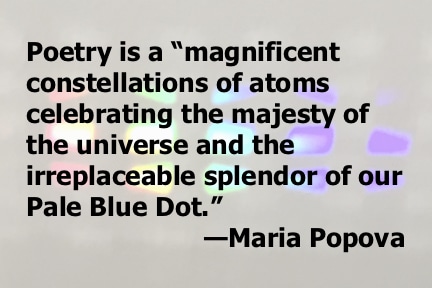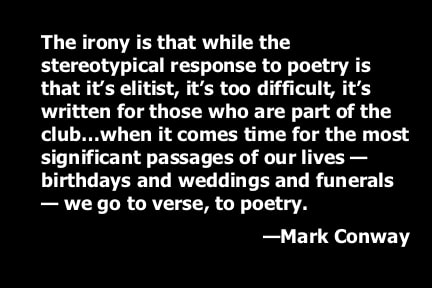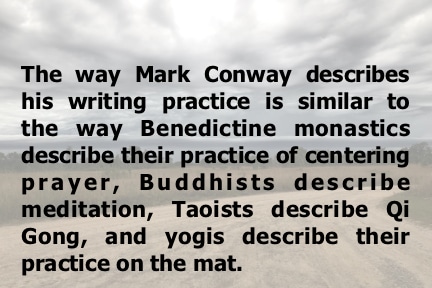Why poetry matters
This is a quote from Argentinian poet Antonio Porchia, which opens the fourth section of Mark Conway’s rivers of the driftless region:
“It’s easier for me to see everything as one thing than to see one
Antonia Porchia
thing as one thing.”
Which suggests poetry is not one thing, and that talking about why it matters is akin to talking about why everything matters.
Reading Mark Conway’s stunning collection of poems in rivers of the driftless region, I felt a growing consciousness of the vitality and essentiality of blizzards, ruins, light, words, rooms, rivers, fire, wheat, light, seeds, birds, zero, fractions, children, fathers and mothers, rain, eyes, wandering, sitting, dirt, lily pads, siberia, the himalaya, the bayou…everything pulsing in time, time pulsing into eternity. I’ll come back to this particular volume shortly. First, I’d like to say more about why poetry matters.

Maria Popova tells us poetry matters when she describes it as “beauty and consolation by calibration of perspective.” She calls poetry a “magnificent constellations of atoms celebrating the majesty of the universe and the irreplaceable splendor of our Pale Blue Dot.”
Which is to say, poetry matters because living matters. But a lot of people aren’t able to recognize the beauty and consolation and celebration available through poetry because, as Mark Conway said during my recent conversation with him, poetry suffers from several problems right now.
The problems poetry faces right now
The first problem Mark identified is that, while people are exposed to film and music all of their lives, most of us lack early and sustained exposure to poetry. “We are able to take in very sophisticated layers of visual meaning in a movie,” he said, “because we’re constantly watching screens. We have that vocabulary of [visual] language, so it’s effortless to fill in the gaps. We feel comfortable with the way that film will jump time or scenes, or create actors and our relationship to them. And a study shows that we choose to listen to new music less than 10% of the time. So 90% of the time we’re hearing the same tune, finding new ways to enjoy the song. But we expect to “get” a poem reading it quickly one time.”
Another problem that prevents people from enjoying the benefits of poetry, is the general perception of poetry as difficult. But, “It should be something we can go to as easily as going to the movies,” he said. “At some point, though, poetry became something that had to be interpreted rather than enjoyed.”
Our culture and education systems don’t offer a gradual, progressive way into poetry. the way we prepare audiences to appreciate film or music. “Ironically,” he said, “One of the first things we do with children is to read them nursery rhymes at bedtime. The content doesn’t make literal sense—the pleasure is all in the sound and rhythm of the words.” Often our first real exposure to poetry is in high school where students are taught sophisticated literary poetry. And often the teachers are uncomfortable with the subject because they think they have to explain the poems. He said, “Poetry is not about paraphrasing, it’s more in the “feel” of the words, that brings in a new dimension and lets you see yourself in the poem.”
Having to start with Shakespeare and T.S. Eliot is akin to trying to instill a love of music in a person, “by starting with Wagner and Beethoven and Shostakovich. There’s no ramp to easy poetry… no primer or beginner’s guide. You’re thrown in the deep end right off the bat. Then people turn their backs on it. But you don’t need to be taught how to enjoy popular music. You trust your own instincts – you don’t know what “ob-la-di, ob-la-da” means, but you feel it. It names something in you, and you keep it for yourself by singing it. Poems operate like that too.”
Also, some people think poets and readers of poetry are just pretending to know what they’re talking about when they really don’t. Or they may feel that elite, highly educated poets are holding specialized knowledge above them.

And when people don’t understand something, they tend to resent it. And yet, Mark said, “The irony is that while the stereotypical response to poetry is that it’s elitist, it’s too difficult, it’s written for those who are part of the club…when it comes time for the most significant passages of our lives — birthdays and weddings and funerals — we go to verse, to poetry.”
Which brings us to another problem with poetry. It’s the same problem we have with everything that calls us to do better, to be better, to build a better way of life. We want it and we want to back away from it, like Doctor Dolittle’s push-me-pull-you.
“We know what we need to do, to be in better physical shape or spiritual shape, and it’s fairly simple,” Mark said. “And we don’t want to do it. It’s too much work. It’s the same sort of thing with …whatever realm it is that poetry explores.”
Because it beckons us into dangerous territory, poetry simultaneously attracts and repels us. It spotlights the beautiful and painful truth of living while knowing we will die. It leads us to a cliff—authenticity—and pushes us into a rushing river—vulnerability.
And that makes us want to run.
We could jump back on the hamster wheel of life before COVID-19. We might effortlessly just get back to being too busy to care. Or we might decide to do something good for our hearts.
We could keep company with beauty and consolation, crafted for us by a poet.
How poetry happens
In one of Mark Conway’s first memories of trying to make his way toward poetry, he was going down to the Mississippi River with a notebook, thinking he would write a poem. His teachers at Cathedral high school in St. Cloud had thrown some good literature at him, and he had run into the poetry of some of the Beats, like Allen Ginsberg and Jack Kerouac, and Walt Whitman. He felt poetry was something he could do.
It was a beautiful spring day. He sat down and was ready to go.
Absolutely nothing came to him.
“It was a big comeuppance at that point,” he said. “I thought, ‘Wait a second, I guess this is not as easy as just being ready to write a poem.’ So that threw me for a while. Because I thought it was something you could do just because you felt the urge to write so strongly.”
Mark has been doing poetry for decades now. He recently retired from directing The Literary Arts Institute at St. Benedict’s College and St. John’s University. rivers of the driftless region is his fourth collection of poems. I asked him how this moving, powerful book came together.
“I don’t think about subject matter or ‘saying something’ that much at the outset,” he said. “I’m more interested in wanting to try out new things out in language I find interesting. And that’s difficult.”
He said that initially, his writing is just a whole bunch of scribbling, until he starts to see themes. “Some patterns become noticeable. Images recur that have a power I can’t quite put my finger on. At that point I try go more directly toward these images and ideas and try to concentrate on them, to see why the attract me.”
It struck me how similar his description of his writing practice is to the way Benedictine monastics describe their practice of centering prayer, Buddhists describe meditation, Taoists describe Qi Gong, and yogis describe their practice on the mat.

“It’s almost more like calisthenics. You’re not rock climbing, you’re staying in the same boring gym, which is not boring because that’s the point of those exercises, that you’re getting better at it….I’m observing the effects of what happens when I bring language together in these certain ways. Similar kinds of ways over and over, but filtered through experience.”
He is interested in keeping his poems authentic to the language that he’s attracted to, There’s a song-like quality that doesn’t follow traditional forms, but the poets he admires use similar approaches in their work.
He explores the ineffable. He works “to give language to those things that are so difficult to talk about.”
Poets create the language they need to do that work, he explained. “Which for us is metaphor, and it’s rhythm and syntax, the words that we know, to try to delineate something that is really beyond perception. Something we’re uncomfortable talking about if we ever do, but it’s at the core of our being, we’re fascinated by it.”
At a certain point, he discovered he wanted to spend time writing about eternity. “I discovered that was one of the themes that kept running through my work. And so I decided I wanted to write toward that directly, even though ‘eternity’ is sort of a cliché. It’s a concept that names something so complex we don’t have to think about it. I wanted to find my own way around it.”
What he basically tried to do with rivers of the driftless region, he said, “Was to bring together the notion that in this moment right now—time is moving ahead and it’s Tuesday at 3:30. But at the same time, eternity is happening. Everything that’s ever happened is happening now. Trying to keep those two thoughts in my head – that time is both serial and ever-present at once, and then writing about that… I could do that — in real time, as we say — for about 20 seconds. And then it would feel like my head was exploding.”
2 poets’ thoughts on reading and writing
1. “If I read a book [and] it makes my whole body so cold no fire can ever warm me, I know that is poetry. If I feel physically as if the top of my head were taken off, I know that is poetry. These are the only ways I know it. Is there any other way?”— Emily Dickinson
2. “No tears in the writer, no tears in the reader. No surprise in the writer, no surprise in the reader.” — Robert Frost
Reports from the interior
I read rivers of the driftless region from cover to cover before I met and spoke with Mark Conway about his book. Not only did I feel physically as if the top of my head were taken off, I entered a place where
small eternities slip
across lily pads
and leak in real-time
down temporal bamboo:
—from “in the miniature garden”
I experienced beautiful and fearful fire, fear of love and a feeling of flying into flames. It was similar to the sensation of holding my friend’s hand at her hospital bedside, when at 52 she took her last breath, and I felt, but could not see, the presence of what I can only name as the angel of death.
I fear most the most beautiful
the city up in flames
the chanting figure’s hair on fire
our horizon lit with prophecies and wings
…
I fear I love the fear
of fire / fear the love
of the loss of—
I fear most the love of
fire—the beauty I can’t stand
—from “in the barely unbearable”
The poem “in his chair—electric,” Mark told me is “about the end of life, when we lose the individual sense of self and become part of the natural world, merging into what’s around us. The normal boundaries are relaxed, there’s less definition between where we stop and what we’re in contact with, even a chair.” This poem was inspired, he said, by“trying to be real to the experience of seeing an actual person move from the human realm into the next … the natural, elemental world. It’s not violence, as much as transformation. Dissolution, but also refiguring.”
Cheryl Strayed’s memoir Wild, about hiking the Pacific Crest Trail was a wildly successful best seller. So was Elizabeth Gilbert’s memoir Eat, Pray, Love: One Woman’s Search for Everything Across Italy, India and Indonesia. Evidently people love to experience adventures through the words of writers who have braved the journey.
Inside the pages of rivers of the driftless region, I encountered momentary awareness of infinity and eternity, concepts nearly impossible to talk about, yet somehow Mark Conway’s language contains them. How does a poet enter eternity, and come back to write about it so we, in the realm of chronological time, can feel its mystery?
“I kept trying to go back toward bringing [the present moment and eternity] together, and just seeing what would happen. I was trying to bring them together for myself, not in any philosophical or theological or scientific way.”
We talked about poetry as a whole-human experience. “I think that’s the distinctive quality of poetry, that it’s made from our bodies. It starts with breath,” he said. “It’s not just the mind that’s engaged, it’s all parts of ourselves.”
In order to find his way into his subject, he did a fair amount of reading about infinity and eternity, just to see what other people said. “There actually isn’t as much written about eternity as one would think,” he told me. “Because it’s part of the ineffable — what can you say? It’s beyond language, it’s beyond experience.”
He says the irony of this work is that it’s not about making new revelations about eternity, really. “But that’s not the point. It’s the spending time with it, and just sort of delivering my reports from the interior.”
back to why poetry matters
In the article “Why the Coronavirus Is Humanity’s Wake-Up Call,” David Cook writes, “As we awaken to the truth of the profound failure of our existing institutions, we also awaken to the truth of our possibilities and interconnections with one another and with Earth. With that awakening comes a recognition that we must now learn to live lightly on the Earth, to war no more, and to dedicate ourselves to the well-being of all in an interdependent world.”
This awareness of the truth of interconnections is easily lost when we’re racing after our own achievements and acquisitions. But there are other ways–easier ways than suffering through a global pandemic–to gain perspective that everything is one thing. Pausing to spend time with poetry is one of those ways.
Poetry can work like an antidote against our instinctual fear of strangeness, against the complacent acceptance of generic standards, against repression and restriction of speech, and against inflexibility. But reading about poetry is like reading about yoga or meditation. It doesn’t change our lives unless we read poetry.
When it comes time for the significant passages of our lives, we turn to poetry. This time of global pandemic is by all means a significant passage. This is a journey of dissolution and refiguring—of transformation. I’m delighted that rivers of the drift less region has entered my life. For these past strange months, this volume has be serving as one of my thoughtful, compassionate companions, offering “beauty and consolation by calibration of perspective,” and I am grateful to Mark Conway for delivering his reports from the interior.

